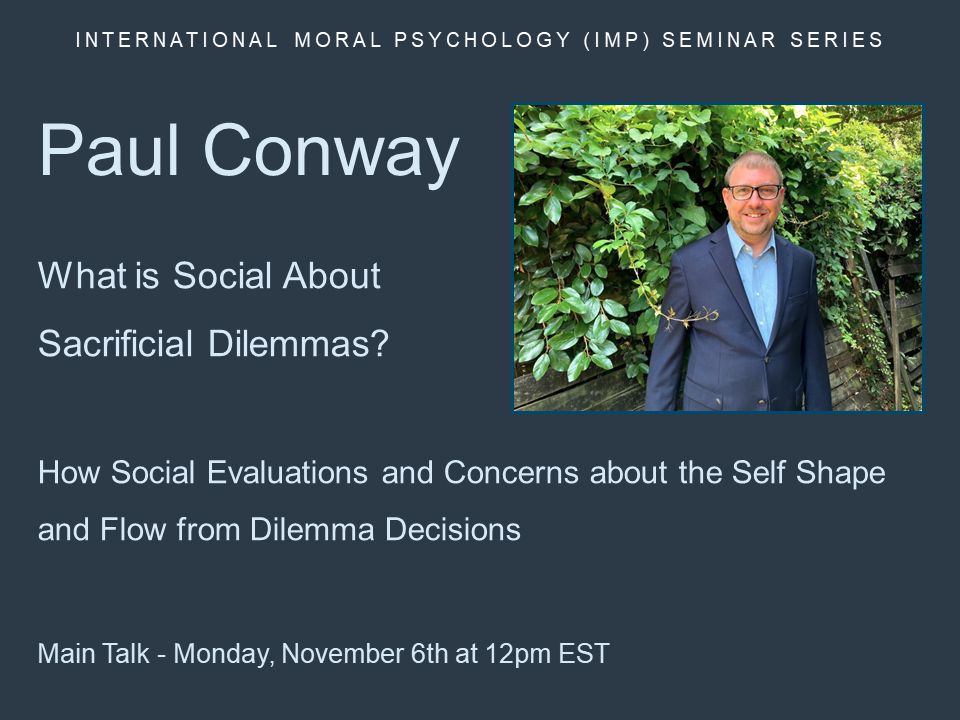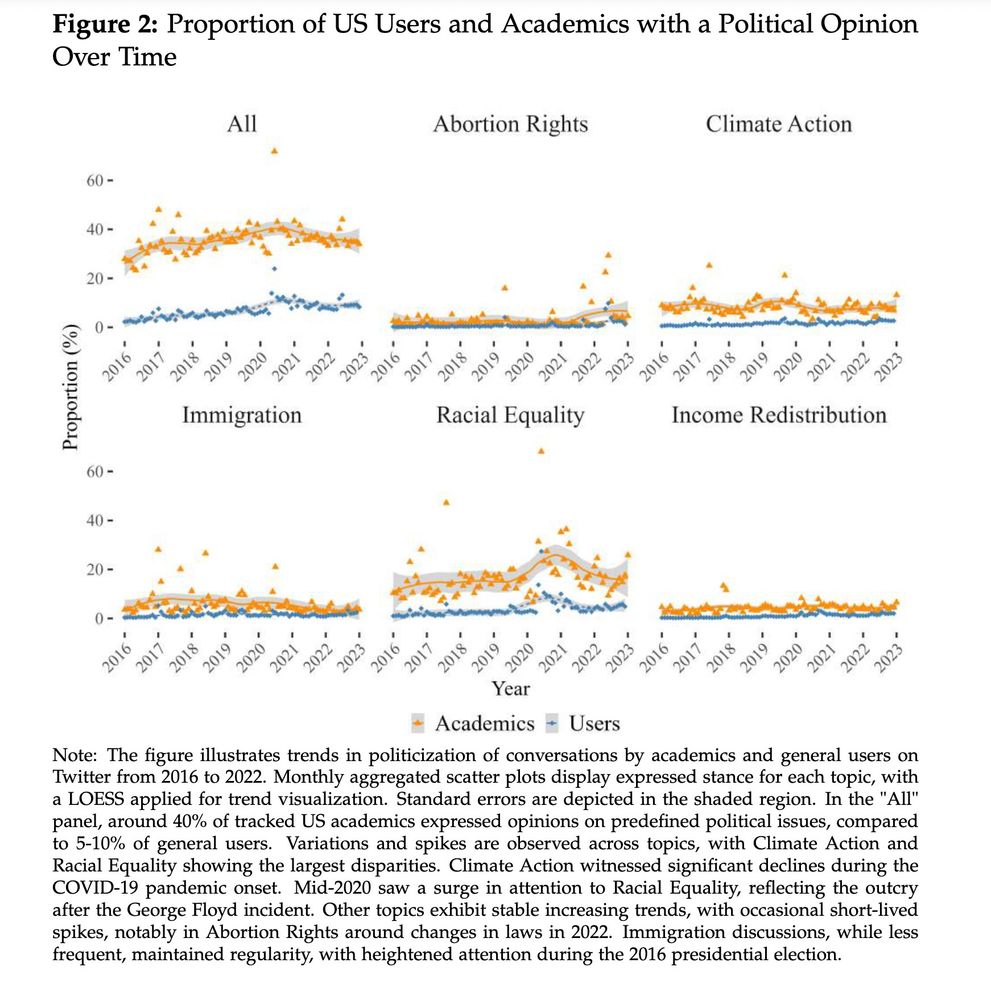
🎓 PhD-promotie, 16 okt. 16:15 uur
𝐖𝐚𝐧𝐧𝐞𝐞𝐫 𝐦𝐞𝐧𝐢𝐧𝐠𝐬𝐯𝐞𝐫𝐬𝐜𝐡𝐢𝐥𝐥𝐞𝐧 𝐦𝐨𝐫𝐞𝐥𝐞 𝐯𝐞𝐥𝐝𝐬𝐥𝐚𝐠𝐞𝐧 𝐰𝐨𝐫𝐝𝐞𝐧
@chantaldamore.bsky.social onderzocht in haar proefschrift How Political Disagreements Escalate into Moral Conflicts hoe zulke conflicten onze democratie onder druk zetten.
👉🏻 Meer: www.rug.nl/gmw/news/251...
13.10.2025 13:46 — 👍 5 🔁 1 💬 0 📌 0
And thanks to the #NWO (Nederlandse Organisatie voor Wetenschappelijk Onderzoek) for funding this project! 3/3
02.05.2025 12:45 — 👍 2 🔁 0 💬 0 📌 0
How do (new) norms emerge and change in society? How do emotional dynamics and social interactions within and between groups give rise to norm violations, emergence and change? What are the implications for pressing topics such as climate change, sexual harresment, polarization? Soon we know more2/3
02.05.2025 12:45 — 👍 2 🔁 0 💬 1 📌 0

Starting my new job as a Postdoctoral researcher this week at the #UniversityOfAmsterdam (UvA)! Sooo excited about this fantastic project with Gerben van Kleef! 1/3
02.05.2025 12:45 — 👍 3 🔁 0 💬 1 📌 0

Even though "academics from poorer backgrounds introduce more novel scientific concepts, [they] are less likely to receive recognition, as measured by citations, Nobel Prize nominations, and awards"
The humanities have the least social mobility, quants have the most papers.ssrn.com/sol3/papers....
28.12.2024 23:59 — 👍 76 🔁 30 💬 3 📌 5
go.bsky.app/QfXzy8h
27.11.2024 19:56 — 👍 19 🔁 13 💬 6 📌 1
Great list! Would love to be added too :)
26.12.2024 15:38 — 👍 0 🔁 0 💬 1 📌 0

Gone Too Far Elite Radicalization Hebel-Sela Aldar Orian Harel Political Psychology
Political hope, anyone? When are leaders go fascist, previous supporters of those leaders actually go less fascist.
See our registered-report longitudinal study, led by @shirahebelsela.bsky.social, Lee Aldar, and @taloharel.bsky.social, with Boaz Hameiri and Eran Halperin, here:
tinyurl.com/3py5n6vb
20.12.2024 11:03 — 👍 25 🔁 10 💬 2 📌 0
Gaswinningsproblemen raken ook Drenthe: schade en psychosociale impact voorbij de provinciegrens
Gaswinningsproblemen raken ook Drenthe: schade en psychosociale impact voorbij de provinciegrens
De impact van de gaswinningsproblematiek stopt niet bij de provinciegrens van Groningen. Een vragenlijstonderzoek, uitgevoerd door Gronings Perspectief, in Drenthe laat zien dat bewoners van deze provincie, met name in de noordelijke grensgebieden, schade en gezondheidsklachten ervaren.
19.12.2024 10:44 — 👍 0 🔁 1 💬 0 📌 0

Really enjoyed presenting my work in this amazing room at the Forum in Groningen, thanks to the ASPO conference 2024!
A new conceptual framework and systematic review to understand the link between rising polarization and healthy democratic functioning. More details on the research following soon!
17.12.2024 14:55 — 👍 3 🔁 0 💬 0 📌 0

Abstract that says Affective polarization is a central characteristic of political competition, but high levels are seen as potentially harmful. In this article, we link the study of affective polarization to that of coalition politics, expecting that by signalling the willingness to cooperate in a coalition, political elites can reduce mutual dislike between political camps. We argue, first, that the impact of coalition formation should depend on the information content (‘surprisingness’) of this signal, and, second, that its effect should spill over to parties outside of the coalition. Combining 20 years of monthly voter-level data from Germany with data on national and regional coalitions, we show that coalitions are most likely to reduce affective distance when participating parties are ideologically distant and when the signals are still recent. Moreover, coalitions have a system-wide impact beyond the specific parties involved. We discuss the implications for the role of political elites in shaping affective polarization.


Party coalitions may reduce affective distance when the parties are ideologically distant and when the coalition is still recent.
journals.sagepub.com/doi/full/10....
#polisky #polpsych
09.12.2024 21:29 — 👍 35 🔁 11 💬 0 📌 1
Wow congrats Charlie!!
30.11.2024 14:24 — 👍 0 🔁 0 💬 0 📌 0

Now published in PNAS! We had a survey in the field at the time of the first assassination attempt on Trump. We found that Rs became significantly less supportive of partisan violence and had increased in-party affect.
www.pnas.org/doi/10.1073/...
26.11.2024 19:22 — 👍 61 🔁 29 💬 2 📌 2

Looking forward to present my ERC StG project at the Dutch Political Psychology Meeting next Friday at the Amsterdam School of Communication Research (ASCoR), organized by @bertbakker.bsky.social @maaikehoman.bsky.social @chantaldamore.bsky.social and Ruthie Pliskin!
24.11.2024 12:52 — 👍 9 🔁 2 💬 0 📌 1

Really excited to share our new paper "How perceived polarization predicts moralization (and vice versa)", now online in JPSP!
dx.doi.org/10.1037/pspi...
Introduces and tests a new model linking polarization with moralization over time.
With Martijn van Zomeren and Namkje Koudenburg
29.02.2024 11:28 — 👍 7 🔁 0 💬 0 📌 0

Paul Conway:
What is Social About Sacrificial Dilemmas? How Social Evaluations and Concerns about the Self Shape and Flow from Dilemma Decisions

Chantal D'Amore:
How Perceived Polarization Predicts Attitude Moralization (and vice versa): A Four-Wave Longitudinal Study During the 2020 US Election
The Next International Moral Psychology (IMP) Seminar Series talks:
Monday, November 6th at 12pm EST
Flashtalk from Chantal D'Amore
Main talk from Paul Conway
Registration: us02web.zoom.us/webinar/regi...
With @drmeltemyucel.bsky.social & @jimaceverett.bsky.social
Can't Wait!!!
31.10.2023 16:34 — 👍 12 🔁 5 💬 0 📌 0
Official Bluesky account of the General Meeting of the European Association of Social Psychology that will take place in Strasbourg in 2026.
PhD candidate Social/Environmental Psychology at the University of Amsterdam
🧠 PhD Political Neuroscience @UvA_ASCoR
🌐 Politics of Adolescence & Democracy http://ippad.eu
📚 Social and Affective Neuroscience
🌌 Sci-Fi enthusiast
🐈 "No damn cat, and no damn cradle.”
PhD candidate at the University of Amsterdam,
AI, Culture & Society research unit @ ILLC.
Social identity / morality / affective polarisation / computational social science.
social psychologist (@LMU Munich) fascinated by antisocial behavior
Post-Doc @ Experimental Psych Oxford studying the role of morality and media in polarization and how to bridge divides.
https://emily-kubin.owlstown.net/
MindCORE postdoctoral research fellow @Penn studying how moral and political views change through conversations and social networks
Professor of Social Psychology in Society at the University of Cambridge and Author of FOOLPROOF: Why We Fall for Misinformation and How to Build Immunity (2023) + The Psychology of Misinformation (2024). Bad News Game.
www.sandervanderlinden.com
associate professor, University of Pennsylvania
Professor of Political Psychology @UvA_Amsterdam
Director @Hotpoliticslab
Blog @stukroodvlees
Website: gijsschumacher.nl
Professor at Northwestern/Kellogg • Author of THE ALL-OR-NOTHING MARRIAGE • Co-host of the LOVE FACTUALLY podcast • Co-director of the CENTER FOR ENLIGHTENED DISAGREEMENT • Post about relationships (sex, marriage) and politics (polarization, free speech).
Psychology prof at the University of Toronto.
Author, teacher. Social, personality, political psychologist. Father, partner, mentor, & friend. Art, music, literature, movie, sports lover.
Associate Professor of Psych Science at Ball State. Studies moral opinions & persuasive messages. Science communicator. Host of the podcast "Opinion Science." Letterpress printing enthusiast. He/him.
Psychology & Politics @humboldtuni.bsky.social
Einstein Research Unit "Coping with Affective Polarization"
Das Leibniz-Institut für Psychology (ZPID) ist die zentrale, überregionale Infrastruktureinrichtung für die Psychologie in den deutschsprachigen Ländern. | The ZPID is the supra-regional research support facility for psycholgy in German-speaking countries.
Social Psychologist @LMU Munich
PhD Student in Government at Cornell University
Fellow at the Center on Global Democracy
Behavioral Political Economy | Political Psychology | Authoritarian Politics
HSE University & Leiden University alum 🏳️🌈
#ArmUkraineNow
georgytarasenko.com
Het populair-wetenschappelijk online psychologiemagazine: toegankelijk, gratis en begrijpelijk. Meer weten en/of een artikel schrijven? Kijk op http://nl.in-mind.org
PhD Candidate at the Vrije Universiteit Brussel (Research group BRISPO) and the University of Groningen




















